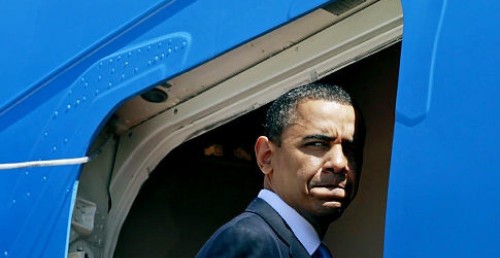PHOTO: US President Barack Obama
The Obama Administration has formally buried its $500 million program to train and equip Syria’s rebels against the Islamic State.
Unnamed Administration officials told The New York Times that Pentagon officials will soon officially announce the end of the program.
US Defense Secretary Ashton Carter foreshadowed the announcement during a press conference with British Defence Minister Michael Fallon in London on Friday. “I wasn’t happy with the early efforts,” Carter said, “So we have devised a number of different approaches.”
Carter added, “I think you’ll be hearing from President Obama very shortly.”
Last month, General Lloyd Austin, the head of US military operations in the Middle East, was humiliated at a Congressional hearing as he said that “only four or five” trained fighters remained on the battlefield. Most of the 54 men inserted into Syria in late July — out of 15,000 who applied for the program — were captured, killed, or left within days as the Free Syrian Army’s Division 30, which hosted the trained rebels, was attacked by the Islamist faction Jabhat al-Nusra.
See Syria Daily, Sept 17: Does the US Know What It’s Doing?
The embarrassment was soon compounded when the commander of a second group of 50 to 75 men turned out the unit’s arms to Nusra and said they would not work with the US.
In the Congressional hearing, Austin pointed to a change in direction when he said that US special forces were working with Syrian Kurdish militia to challenge the Islamic State — a statement quickly clarified by the Pentagon to say the US advisors were operating from Turkey, rather than inside Syria.
The Pentagon and Administration officials then told selected journalists that the US would pursue a new strategy of equipping and advising the Kurdish militia, supported by Free Syrian Army units, to advance on the Islamic State center of Raqqa in northern Syria.
The officials did not explain how the operation would work, given that the Kurdish political leadership PYD has said it does not want to lead an operation against Raqqa and that mainly-Arab rebel units have rejected Kurdish direction of such an offensive.
A “senior Defense Department official” confirmed the end of the $500 million program, authorized in September 2014, and said a much smaller training center would be set up in Turkey to teach operational maneuvers to “enablers”, including how to call in US airstrikes.
Another “senior administration official” — saying that “training thousands of infantry was not the right model, I think that’s become pretty clear” — said the US could support unnamed Sunni Arab rebels in eastern Syria who were already fighting the Islamic State, “rather than using training to try to manufacture new brigades”.
The officials said President Obama approved the shift in strategy last week at two high-level meetings, including a National Security session on Thursday.
At the same time, Obama rejected Secretary of State John Kerry’s attempt to revive the idea of a protected area along the Turkish border in northern Syria. In July, the Turks said the long-proposed initiative could be implemented in a 98-km (61-mile) belt in Aleppo Province, but the US immediately backed away from any “safe zone” or “no-fly zone” and said that the plan was only to clear out the Islamic State.
The US strategy and operations have been further complicated by Russia’s aggressive military intervention, with bombing from September 30 and support for an Assad regime ground offensive that began a week later. The New York Times summarized, from conversations with unnamed advisors:
Mr. Obama may have to essentially wait out Russia’s intervention. Frustrated by their own inability to resolve the crisis over more than four years, the President and his team express a quiet confidence that Moscow almost certainly will be no more successful.
However, the view of their advisors already appears to have been overtaken by further caution. They were telling the Times of the “plans to put fresh pressure on [the Islamic State in] Raqqa”, rather than the scaling back of the operational center in Turkey.
One unnamed “senior administration official” indicated that political thinking had gone even farther in a US pullback from intervention, telling Bloomberg News, “The White House somehow thinks we can de-escalate the conflict while keeping Assad in power.”
Bloomberg claimed that “[the] view [is] being pushed by top White House National Security staffers, including senior coordinator for the Middle East Rob Malley”.
Meanwhile, Syrian rebels have been dismissive of the latest US changes. Hassan Haj Ali, the commander of Suquor Jabal al-Zawiya, said, “[The program] was nothing to us.”
He continued, “I don’t think the US has a plan in Syria.”

